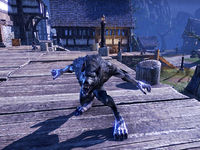| This page is currently being rewritten as part of the Online Quest Project. The page is being both written and checked. All users are welcome to make changes to the page. If you make a change that is relevant to the project, please update this template accordingly, and make sure you have observed the project guidelines. Detail
Quick Summary: not written
Quest Stages: not written |
|
Duke Sebastien thinks that werewolves may be trying to infiltrate and take over Aldcroft, just as they overthrew Camlorn.
Quick WalkthroughEdit
- Talk to Duke Sebastien and Gloria Fausta.
- Reveal and defeat hidden Werewolves.
- Return to Duke Sebastien.
Detailed WalkthroughEdit
On The HuntEdit
Speak with Duke Sebastien who tells you that Werewolves are hiding in Aldcroft and then tells you to speak to Gloria Fausta. Now go and talk to Gloria is right behind him near the stairs. She tells you that the amulet forces werewolves to reveal their true nature. Leave and go east from the building and climb onto the docks. Once there go up to Camlorn refugees and activate the amulet, if they reveal themselves to be a werewolf kill them, do this until you've killed five werewolves. Now return to the Duke and speak with him for your reward.
NotesEdit
- The amulet can continue to be used more than once on refugees even after they've been proven not to be werewolves, with no extra effects.
Quest StagesEdit
| Wolves in the Fold | |
|---|---|
| Finishes Quest | Journal Entry |
|
Objective: Reveal and Defeat Hidden Werewolves
|
|
|
Objective Hint: Talk to Gloria Fausta
|
|
|
Objective: Talk to Duke Sebastien
|
|
Notes
* Any text displayed in angle brackets (e.g.,
<Alias=LocationHold>) is dynamically set by the game and will be filled in with the appropriate word(s) when seen in game.
- Not all Journal Entries may appear in your journal; which entries appear and which entries do not depends on the manner in which the quest is done.
- Stages are not always in order of progress. This is usually the case with quests that have multiple possible outcomes or quests where certain tasks may be done in any order. Some stages may therefore repeat objectives seen in other stages.
